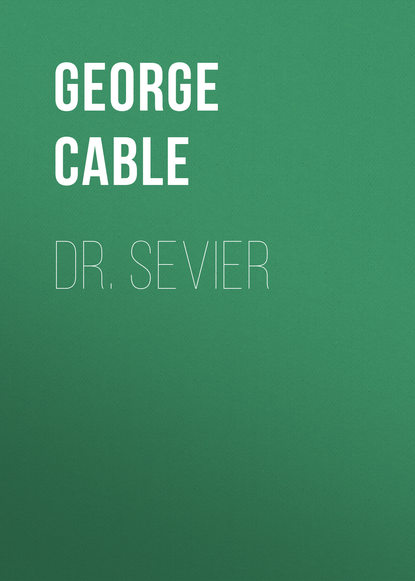По всем вопросам обращайтесь на: info@litportal.ru
(©) 2003-2024.
✖
Dr. Sevier
Настройки чтения
Размер шрифта
Высота строк
Поля
“Aha!” said the man, and moved away a little. But in a moment Richling, becoming aware that his questioner was glancing all over him with critical scrutiny, turned, and the man spoke.
“D’you keep books?”
Just then a way opened among the vehicles; and the man, young and muscular, darted into it, and Richling followed.
“I can keep books,” he said, as they reached the farther curb-stone.
The man seized him by the arm.
“D’you see that pile of codfish and herring where that tall man is at work yonder with a marking-pot and brush? Well, just beyond there is a boarding-house, and then a hardware store; you can hear them throwing down sheets of iron. Here; you can see the sign. See? Well, the next is my store. Go in there – upstairs into the office – and wait till I come.”
Richling bowed and went. In the office he sat down and waited what seemed a very long time. Could he have misunderstood? For the man did not come. There was a person sitting at a desk on the farther side of the office, writing, who had not lifted his head from first to last, Richling said: —
“Can you tell me when the proprietor will be in?”
The writer’s eyes rose, and dropped again upon his writing.
“What do you want with him?”
“He asked me to wait here for him.”
“Better wait, then.”
Just then in came the merchant. Richling rose, and he uttered a rude exclamation: —
“I forgot you completely! Where did you say you kept books at, last?”
“I’ve not kept anybody’s books yet, but I can do it.”
The merchant’s response was cold and prompt. He did not look at Richling, but took a sample vial of molasses from a dirty mantel-piece and lifted it between his eyes and the light, saying: —
“You can’t do any such thing. I don’t want you.”
“Sir,” said Richling, so sharply that the merchant looked round, “if you don’t want me I don’t want you; but you mustn’t attempt to tell me that what I say is not true!” He had stepped forward as he began to speak, but he stopped before half his words were uttered, and saw his folly. Even while his voice still trembled with passion and his head was up, he colored with mortification. That feeling grew no less when his offender simply looked at him, and the man at the desk did not raise his eyes. It rather increased when he noticed that both of them were young – as young as he.
“I don’t doubt your truthfulness,” said the merchant, marking the effect of his forbearance; “but you ought to know you can’t come in and take charge of a large set of books in the midst of a busy season, when you’ve never kept books before.”
“I don’t know it at all.”
“Well, I do,” said the merchant, still more coldly than before. “There are my books,” he added, warming, and pointed to three great canvassed and black-initialled volumes standing in a low iron safe, “left only yesterday in such a snarl, by a fellow who had ‘never kept books, but knew how,’ that I shall have to open another set! After this I shall have a book-keeper who has kept books.”
He turned away.
Some weeks afterward Richling recalled vividly a thought that had struck him only faintly at this time: that, beneath much superficial severity and energy, there was in this establishment a certain looseness of management. It may have been this half-recognized thought that gave him courage, now, to say, advancing another step: —
“One word, if you please.”
“It’s no use, my friend.”
“It may be.”
“How?”
“Get an experienced book-keeper for your new set of books” —
“You can bet your bottom dollar!” said the merchant, turning again and running his hands down into his lower pockets. “And even he’ll have as much as he can do” —
“That is just what I wanted you to say,” interrupted Richling, trying hard to smile; “then you can let me straighten up the old set.”
“Give a new hand the work of an expert!”
The merchant almost laughed out. He shook his head and was about to say more, when Richling persisted: —
“If I don’t do the work to your satisfaction don’t pay me a cent.”
“I never make that sort of an arrangement; no, sir!”
Unfortunately it had not been Richling’s habit to show this pertinacity, else life might have been easier to him as a problem; but these two young men, his equals in age, were casting amused doubts upon his ability to make good his professions. The case was peculiar. He reached a hand out toward the books.
“Let me look over them for one day; if I don’t convince you the next morning in five minutes that I can straighten them I’ll leave them without a word.”
The merchant looked down an instant, and then turned to the man at the desk.
“What do you think of that, Sam?”
Sam set his elbows upon the desk, took the small end of his pen-holder in his hands and teeth, and, looking up, said: —
“I don’t know; you might – try him.”
“What did you say your name was?” asked the other, again facing Richling. “Ah, yes! Who are your references, Mr. Richmond?”
“Sir?” Richling leaned slightly forward and turned his ear.
“I say, who knows you?”
“Nobody.”
“Nobody! Where are you from?”
“Milwaukee.”
The merchant tossed out his arm impatiently.
“Oh, I can’t do that kind o’ business.”
He turned abruptly, went to his desk, and, sitting down half-hidden by it, took up an open letter.
“I bought that coffee, Sam,” he said, rising again and moving farther away.






